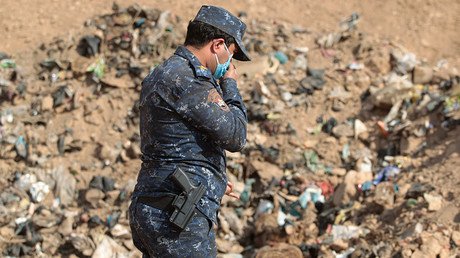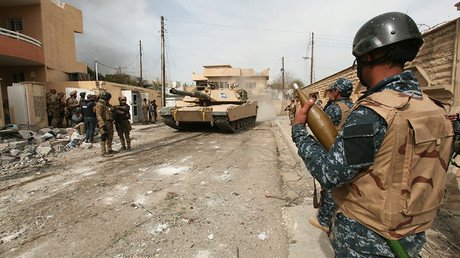‘We’re scared, tired, hungry’: Civilians in West Mosul face acute food, water & medicine shortages
In what is believed to be the biggest exodus since local forces stepped up their operations to retake the western part of the city from Islamic State terrorist group (IS, formerly ISIS/ISIL) a week ago, the UN is now working to expand its camps near the city.
Up to 400,000 civilians could be displaced by the fighting in west Mosul, according to humanitarian organizations’ estimates. While people continue to flee to safer areas from the western districts of Mosul, the existing camps near the city currently cannot house all the people expected to be displaced.
“We believe there are around 750,000 people, with more than 300,000 children [among them] inside west Mosul, and we believe half of that number of people would flee,” UNICEF regional emergency coordinator in Iraq, Bastien Vigneau told RT.
Based on these estimation figures, the UN is working to provide additional shelter and assistance inside camps, the UN official added, saying the organization is gravely concerned about the humanitarian situation affecting residents of west Mosul.
“There is no water, no food, no bread. Nothing,” a displaced man from Mosul told RT. Another one said: “We left our house, our cars, everything we owned, we took nothing but our clothes. We are scared, tired and hungry. My situation speaks for itself.”
“There are hundreds of thousands of civilians still inside west Mosul, still living under ISIS. These are people who have extremely limited access to food, clean drinking water, medication. And as the fighting rages, we simply have no idea how long these people are going to remain without access to all of those things,” Human Rights Watch (HRW) Senior Iraq Researcher, Belkis Wille confirmed to RT.
“The food and commodities pipelines in West Mosul have been broken for quite some weeks, and we get really desperate feedback from the people who we are able to reach,” UNICEF's Vigneau said, adding that some of the worst reports have been recently “confirmed by the west Mosul citizens who are fleeing the combat zones and start to arrive at the south part of the city, Hamam Al Alil.”
Located some 30 kilometers (20 miles) from west Mosul, the area has become a site for UN camps, with new shelters being constructed by the organization in a short period of time.
“There are a lot of lessons learnt at least by UNICEF from east Mosul,” the UNICEF coordinator told RT, saying that the situation in west Mosul is even “more complicated.”
“When the security allows humanitarian access, we will provide first emergency response,” he said, adding that for the time being efforts are concentrated on providing “first assistance and rapid response items such as hygiene kits, bottled water and canned food” for the Iraqi people “until they can reach a camp” with more services.
Iraqi forces’ actions in #Mosul ‘may amount to war crimes' - HRW https://t.co/mkPk7cegAT
— RT (@RT_com) 17 February 2017
The HRW official also told RT about the pointers gleaned during the offensive in the eastern part of the city.
“There was a call from the government on the civilians of Mosul to stay inside their homes,” according to Wille, who said that “as a result of that we actually saw a much lower number of people displaced by the fighting.”
A lot of displacement was “internal,” she said, explaining that people were moving from neighborhood to neighborhood inside Mosul.
Around 750,000 people still remain in western #Mosul - #UN https://t.co/FpNuf6tnSI
— RT (@RT_com) 19 February 2017
“In west Mosul, it’s very much the same. The government has called on the civilians to stay in their homes if they can, and if not, to ideally displace within the area,” the HRW researcher told RT, adding that in her opinion such tactics “will make the operation much more manageable.”
“The main recommendation that the Iraqi authorities made early on, in the beginning of this operation was something called 'white flagging.' Civilians should put white flags on their roofs and their doors,” she explained, saying that by such signs the army will know there are no militants inside and that “this proved quite effective in east Mosul.”
Yet, it is “extremely tricky to know who is a civilian and who isn't,” she conceded, saying that although “anyone fleeing is treated as a potential terrorist suspect, and go through screening process... in west Mosul it will be extremely hard for armed forces... to make that distinction correctly.”
West #Mosul trap: Iraqi forces retake 2 districts, up to 800,000 civilians caught in battle zone https://t.co/MCCqofXH2R
— RT (@RT_com) 26 February 2017
“In a battle like that... the civilians are always the damage that happens in any type of street fighting,” retired US Army Major General, Paul Vallely told RT.
“It's always a tragedy, but in order to completely neutralize and defeat the ISIS forces within that urban area, this is just what happens in warfare,” he said.
BREAKING: Iraqi forces retake Mosul airport from #ISIS – state TV https://t.co/nk2FFTQcpf pic.twitter.com/qDouT2vkIC
— RT (@RT_com) 23 February 2017
US advisers have been working with Iraqi forces in order to facilitate the evacuation process, the retired military official who has been to Mosul said, adding that not all tactics, like humanitarian corridors – however effective in other areas – may be applicable to the Iraqi city.
“Mosul is a very large city, there are lots of roads in and out, and trying to identify where these humanitarian efforts have to be placed especially in the evacuation... requires a lot of precision, planning, and execution.”
Putting shelter in place for the huge number of people fleeing the violence in a relatively short time period will also be “very challenging on the ground,” he said, adding that “there will be casualties.”
The US general's warnings are echoed by a former Iraqi minister of human rights, Bahtiyar Amin, who told RT that “certainly there will be casualties among the civilian population, there will be suffering and displacement” amid the Mosul offensive.
Saying that “it's not an easy operation,” the former official said that “the Iraqi ministry of defense and ministries related to migration, the entire government are very concerned about the human side of this operation, and are addressing the humanitarian needs constantly.”
Islamic State “have committed crimes, including genocide war crimes in Iraq and are occupying one-third of our country,” he said, but added that the moral of jihadists “is very low,” with internal struggles within the terrorist group, and “some terrorists fleeing.”

